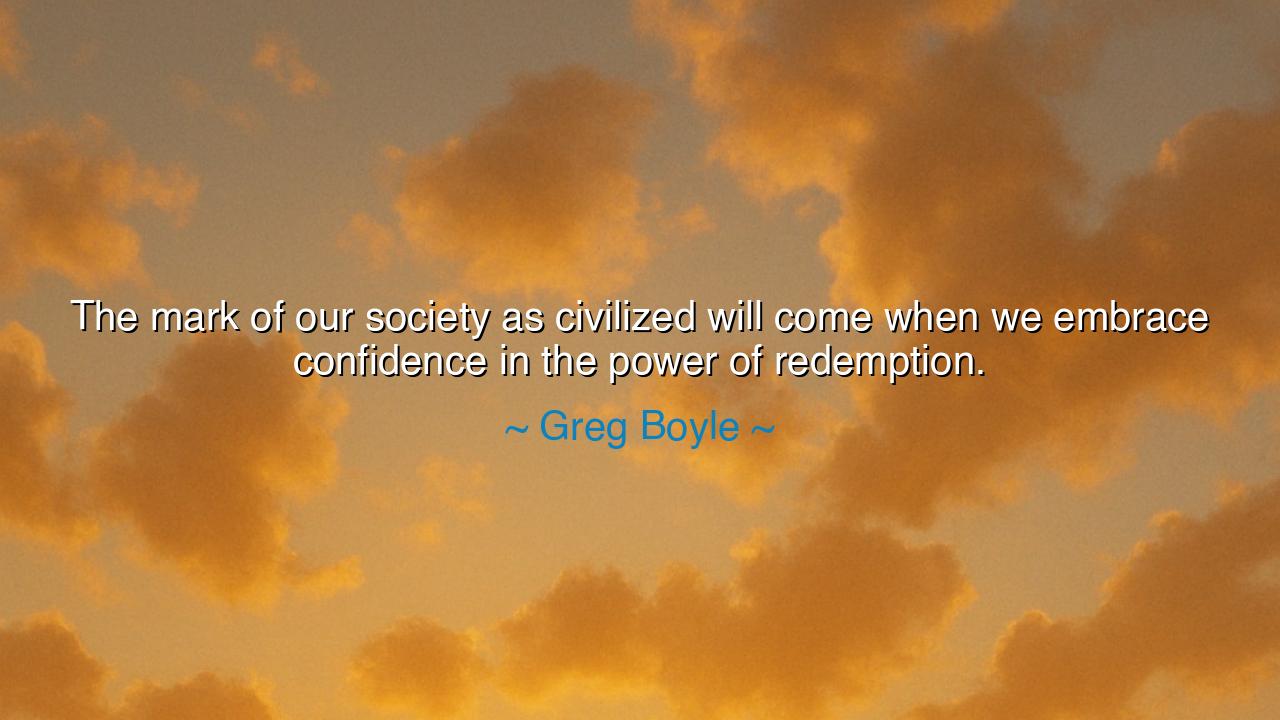
The mark of our society as civilized will come when we embrace
The mark of our society as civilized will come when we embrace confidence in the power of redemption.






Greg Boyle, the Jesuit priest who walked among the forgotten and built kinship with the broken, once proclaimed: “The mark of our society as civilized will come when we embrace confidence in the power of redemption.” These words are not the ornament of philosophy, but the distilled wisdom of a man who lived daily among those cast aside by the world. He reminds us that true civilization is not measured by wealth, nor armies, nor monuments, but by the courage to believe that no soul is beyond healing, no life beyond restoration.
The meaning is sharp, radiant, and humbling. To call a society civilized is to say it has grown beyond vengeance, beyond the endless cycle of punishment and exclusion. It is to say that its people have discovered a deeper strength: the ability to see not only the crime but the possibility of change, not only the wound but the promise of healing. Boyle insists that our greatness will not be found in how harshly we condemn, but in how bravely we forgive, and how firmly we trust in the possibility of redemption.
History has shown this truth in both light and shadow. Consider the aftermath of South Africa’s long night of apartheid. When the chains were finally broken, the nation could have chosen retribution, drowning itself in blood and revenge. Yet through the Truth and Reconciliation Commission, it sought a different path: to bring wrongs into the light, to hear the cries of victims, but also to give space for redemption to those who confessed and sought forgiveness. It was not perfect, but it was a moment when a wounded society chose the harder, braver path of believing in renewal rather than annihilation.
On the other hand, history warns us of what happens when redemption is denied. In the wake of World War I, Germany was crushed with punishment and humiliation. No faith in transformation was granted, no path for healing offered. Out of this soil of bitterness and rejection, darker forces arose, leading to another, more terrible war. Here the absence of confidence in redemption revealed itself as a poison, birthing greater destruction. This, too, teaches us that mercy is not weakness—it is the only path that prevents ruin.
Boyle’s words also echo in the small, quiet corners of life. In his own ministry with gang members in Los Angeles, he watched men and women, once feared as enemies of society, discover dignity when offered work, education, and love. Many who were discarded as irredeemable found new life through compassion. Each of their stories whispers the same truth: a civilized society is not one that abandons its wounded, but one that dares to walk with them toward healing.
The lesson for us, then, is both simple and immense. If we wish to call our society truly civilized, we must measure ourselves not by how many prisons we build, but by how many lives we restore. We must ask: do we believe in the possibility of redemption, or have we surrendered to despair? A people who loses faith in redemption loses faith in humanity itself. But a people who embraces it grows stronger, wiser, and more deeply human.
Practical action lies before us. Do not dismiss the fallen as forever lost. Support systems of rehabilitation, education, and second chances. Practice in your own life the courage of forgiveness, even when anger tempts you otherwise. When confronted by the brokenness of others, resist the urge to cast them aside; instead, ask how they might be healed, and how you might play a part. In doing so, you become the bearer of the very confidence in redemption that Boyle declared as the mark of true civilization.
So let his words echo like a beacon: “The mark of our society as civilized will come when we embrace confidence in the power of redemption.” Carry them as a challenge to your heart and as a compass for your community. For when we believe in redemption—not as fantasy, but as living practice—we will create a civilization not only of order and strength, but of mercy, love, and enduring humanity. And that, above all, is the highest measure of a people.






AAdministratorAdministrator
Welcome, honored guests. Please leave a comment, we will respond soon